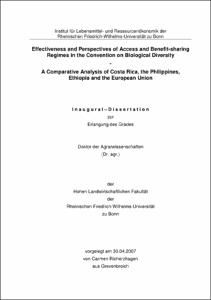Richerzhagen, Carmen: Effectiveness and Perspectives of Access and Benefit-sharing Regimes in the Convention on Biological Diversity : A Comparative Analysis of Costa Rica, the Philippines, Ethiopia and the European Union. - Bonn, 2007. - Dissertation, Rheinische Friedrich-Wilhelms-Universität Bonn.
Online-Ausgabe in bonndoc: https://nbn-resolving.org/urn:nbn:de:hbz:5N-12111
Online-Ausgabe in bonndoc: https://nbn-resolving.org/urn:nbn:de:hbz:5N-12111
@phdthesis{handle:20.500.11811/2733,
urn: https://nbn-resolving.org/urn:nbn:de:hbz:5N-12111,
author = {{Carmen Richerzhagen}},
title = {Effectiveness and Perspectives of Access and Benefit-sharing Regimes in the Convention on Biological Diversity : A Comparative Analysis of Costa Rica, the Philippines, Ethiopia and the European Union},
school = {Rheinische Friedrich-Wilhelms-Universität Bonn},
year = 2007,
note = {The decline of biodiversity has reached an alarming rate and all the approaches that have been undertaken in the past were not sufficient to stop the on-going process. One of these approaches is Access and Benefit-Sharing (ABS), a market-based approach, which has been established with the adoption of the Convention on Biological Diversity (CBD) in 1992. The underlying idea of ABS is that it turns biodiversity and genetic resources from an open access good to a private or club good and creates a market for genetic resources. It internalizes the resources’ positive externalities by pricing the commercial values for research and development and makes users pay for it. Users’ benefits are shared with the resource holders and set incentives for the sustainable use and the conservation of biodiversity. So far the theory. However, in practice the question arises how the concept has to be designed to be an effective approach to contribute to the protection of biodiversity and to the fair and equitable sharing of benefits arising from the commercialization.
In this study, the effectiveness of the ABS concept with regard to biodiversity conservation is defined as “the capability of the ABS regime i) to set incentives for the sustainable use and the conservation of biodiversity, ii) to facilitate access to plant genetic material and iii) to enhance a fair and equitable benefit-sharing”. To measure the realization of these objectives, their determinants, the so-called critical factors, they have to be identified. In this study they are derived from the application of economic theory to the loss of biodiversity and the ABS concept, and from the empirical findings of three case studies of biodiversity-providing countries Costa Rica, the Philippines and Ethiopia and one case study of a community of user countries, the European Union (EU). The identified critical factors are property rights, information asymmetries, time lags, good governance, administrative complexity, and market structure. Depending on how they are addressed through the implementation of ABS on the national level the effectiveness can be assessed. This study discusses user and provider measures that have the potential to address the critical factors. Finally, the study formulates policy recommendations for an international ABS regime based on the results of the study.},
url = {https://hdl.handle.net/20.500.11811/2733}
}
urn: https://nbn-resolving.org/urn:nbn:de:hbz:5N-12111,
author = {{Carmen Richerzhagen}},
title = {Effectiveness and Perspectives of Access and Benefit-sharing Regimes in the Convention on Biological Diversity : A Comparative Analysis of Costa Rica, the Philippines, Ethiopia and the European Union},
school = {Rheinische Friedrich-Wilhelms-Universität Bonn},
year = 2007,
note = {The decline of biodiversity has reached an alarming rate and all the approaches that have been undertaken in the past were not sufficient to stop the on-going process. One of these approaches is Access and Benefit-Sharing (ABS), a market-based approach, which has been established with the adoption of the Convention on Biological Diversity (CBD) in 1992. The underlying idea of ABS is that it turns biodiversity and genetic resources from an open access good to a private or club good and creates a market for genetic resources. It internalizes the resources’ positive externalities by pricing the commercial values for research and development and makes users pay for it. Users’ benefits are shared with the resource holders and set incentives for the sustainable use and the conservation of biodiversity. So far the theory. However, in practice the question arises how the concept has to be designed to be an effective approach to contribute to the protection of biodiversity and to the fair and equitable sharing of benefits arising from the commercialization.
In this study, the effectiveness of the ABS concept with regard to biodiversity conservation is defined as “the capability of the ABS regime i) to set incentives for the sustainable use and the conservation of biodiversity, ii) to facilitate access to plant genetic material and iii) to enhance a fair and equitable benefit-sharing”. To measure the realization of these objectives, their determinants, the so-called critical factors, they have to be identified. In this study they are derived from the application of economic theory to the loss of biodiversity and the ABS concept, and from the empirical findings of three case studies of biodiversity-providing countries Costa Rica, the Philippines and Ethiopia and one case study of a community of user countries, the European Union (EU). The identified critical factors are property rights, information asymmetries, time lags, good governance, administrative complexity, and market structure. Depending on how they are addressed through the implementation of ABS on the national level the effectiveness can be assessed. This study discusses user and provider measures that have the potential to address the critical factors. Finally, the study formulates policy recommendations for an international ABS regime based on the results of the study.},
url = {https://hdl.handle.net/20.500.11811/2733}
}






